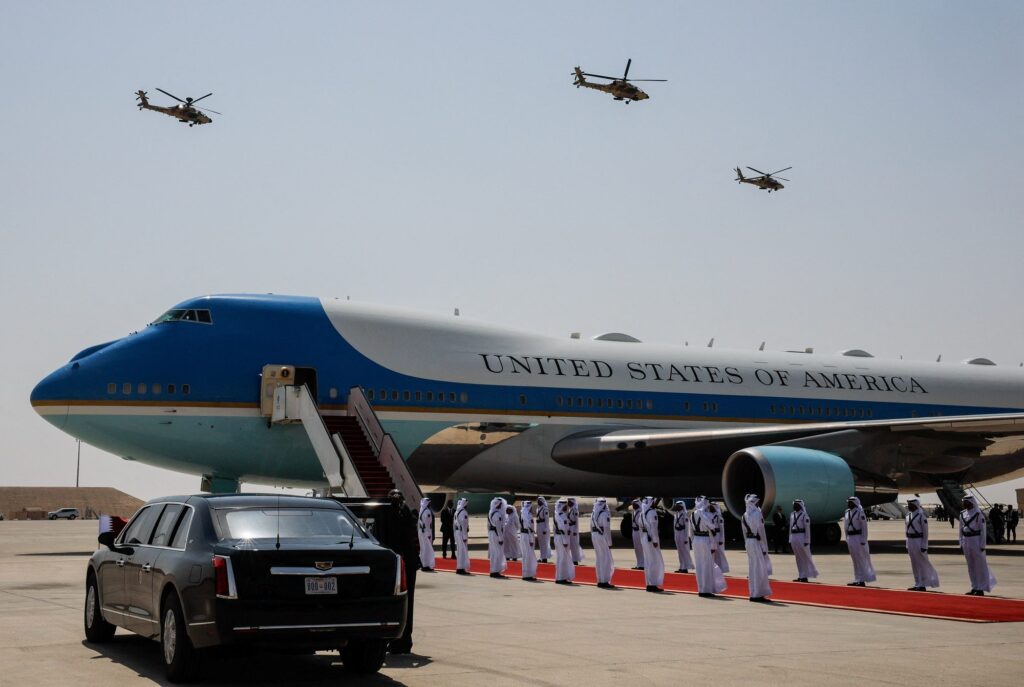President Trump’s decision to accept the gift of a $400m Boeing 747 aircraft from the government of Qatar has gone down predictably badly in some quarters in the USA.
One top Democrat Senator called it “outrageous” and “bribery in broad daylight”. Even Republicans have caviled at the ethical and constitutional issues in accepting such a “gift” from a foreign government, and the estimated $1bn it will cost to retrofit the plane to presidential standards of comfort and security.
Trump defenders have taken their tone from the president, who has said it is “stupid” not to accept the plane. They have suggested jealousy on the part of the critics, who will have to continue making do with first class scheduled travel and Gulfstream private jets while Trump enjoys his “palace in the sky”.
But those Congressmen who still seek to have the gift overturned through exercise of the Emoluments Clause of the US Constitution, which prohibits gifts from foreign governments, should perhaps ask themselves this question: is this so unusual, at least by standards in the Arabian Gulf?
Gifts like this in the Middle East are equally about status, honour, generosity and hospitality
Here, gift-giving is a deeply embedded part of government and business culture. Foreign VIPs – including past US presidents – can expect ostentatious gifts including valuable watches, jewelry and even luxury cars, while on duty in the region.
In the past, these have usually been logged and handed over to the US National Archive, which Trump no doubt considers “stupid” again. He has said the Department of Defense will be the official recipient of the plane, which he has promised not to use once he is out of office. We shall see.
But it should be emphasised that gifts like this in the Middle East are not really about bribery, corruption or financial reward. They are equally about status, honour, generosity and hospitality.
It’s not as though such an extravagant gift as a gilded airliner was sufficient to persuade the President to open a luxury golf resort in Qatar, is it? His family decided on that long before the news about the plane broke.
Sadly, I’ve never been considered VIP enough to be on the receiving end of such lavish generosity. But journalists in the region are often offered some quite valuable trinkets for their attendance and participation in normal media events – leading to some serious ethical issues.
Refuse the largesse and risk offending the giver, who may be a seriously influential individual? Or stuff it away in the family vault and pretend nothing has happened?
A colleague relates how he was given a Rolex by a Kuwaiti businessman after flying to the emirate for an interview. Being an ethical kind of guy but not wishing to give offence, he decided to bring the valuable item back to Dubai, where he sold it and gave the cash to a children’s charity. Bravo to that man.
Most gifts to journalists in the region are not so lavish, and are quite carefully disguised as essential “product sampling” or “review material”, rather than inducements. Electronics companies, for example, often include their latest phone or iPad in the tote bag alongside the notepad and corporate pen.
In my experience, the rule-sticklers in the international media usually refuse such generosity, explaining painfully how “London” will not like the idea of accepting the gift.
Local media tends not to be so picky, and may amble off from a press conference weighed down with items to keep their wives and teenage children happy for weeks to come.
Does that acceptance earn the giver unduly positive coverage?
In this respect, I can only quote the poet Humbert Wolfe:
You cannot hope to bribe or twist
(Thank God!) the British journalist.
But seeing what the man will do,
unbribed, there’s no occasion to.
Ironically, I think you can substitute virtually any nationality for “British” in the above epigram – except perhaps “American”. US journalists are far too straight, of course.
Trump is obviously not a journalist – he appears to loathe us – nor does he appear particularly bound by any conventional ethical code. The gift of a flying palace is more symptomatic of what critics still euphemistically call Trump’s “transactional” style of diplomacy.
The Qatari prime minister Sheikh Mohammed Bin Abdulrahman Al Thani has denied the 747 was a bribe, describing it as “a normal thing”. In the perspective of Arabian Gulf normality, that is probably true.
Frank Kane is Editor-at-Large of AGBI and an award-winning business journalist. He acts as a consultant to the Ministry of Energy of Saudi Arabia



